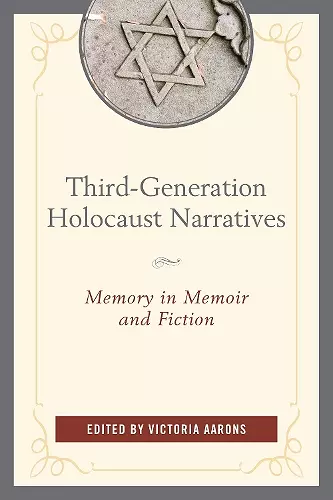Third-Generation Holocaust Narratives
Memory in Memoir and Fiction
Format:Paperback
Publisher:Lexington Books
Published:23rd Mar '18
Currently unavailable, and unfortunately no date known when it will be back
This paperback is available in another edition too:
- Hardback£95.00(9781498517164)

This collection of new essays examines third-generation Holocaust narratives and the inter-generational transmission of trauma and memory. This collection demonstrates the ways in which memory of the Holocaust has been passed along inter-generationally from survivors to the second-generation—the children of survivors—to a contemporary generation of grandchildren of survivors—those writers who have come of literary age at a time that will mark the end of direct survivor testimony. This collection, in drawing upon a variety of approaches and perspectives, suggests the rich and fluid range of expression through which stories of the Holocaust are transmitted to and by the third generation, who have taken on the task of bearing witness to the enormity of the Holocaust and the ways in which this pronounced event has shaped the lives of the descendants of those who experienced the trauma first-hand. The essays collected—essays written by renowned scholars in Holocaust literature, philosophy, history, and religion as well as by third-generation writers—show that Holocaust literary representation has continued to flourish well into the twenty-first century, gaining increased momentum as a third generation of writers has added to the growing corpus of Holocaust literature. Here we find a literature that laments unrecoverable loss for a generation removed spatially and temporally from the extended trauma of the Holocaust. The third-generation writers, in writing against a contemporary landscape of post-apocalyptic apprehension and anxiety, capture and penetrate the growing sense of loss and the fear of the failure of memory. Their novels, short stories, and memoirs carry the Holocaust into the twenty-first century and suggest the future of Holocaust writing for extended generations.
This collection considers works written by grandchildren, great nieces and nephews, and other relatives about family members who lived during the Hitler years. The term third generation raises some issues. In speaking about the literature of the Holocaust, “the literature of the first generation” meant the testimony of those who lived through the horrors of the Third Reich, those who either survived the death camps (Primo Levi, Ellie Wiesel, Imre Kertesz, et al.) or lived in hiding in the ghettos or as partisan fighters. It did not include those who lived safely through the Nazi years in protected areas or foreign countries. When critics and scholars begin to use terms such as 3G literature and introduce expressions such as 1.5G, 2G, 2.5G, and 3G, one senses that 3.5G and 4G loom in the future; lost is the emphasis on the quality of the story, novel, memoir, biography, film, or research being produced. Generational criticism privileges familial relationships. At its worse, it exploits the experiences of others. Important in this regard is critique of how writers far removed from the Holocaust preserve memory and provide witness to a past they never experienced. The best of these essays do that well, and this book is valuable for doing that service. Summing Up: Recommended. Graduate students, researchers, faculty. * CHOICE *
A valuable, searching collection of Third Generation views of the Holocaust, views still proximate to that event and yet increasingly distanced from it. The accounts selectively presented here are both reflective and provide intimate detail, and Aarons' skill in editing brings out with great clarity the effect of time's passage on memory, art, and trauma in the aftermath of the Holocaust. -- Berel Lang, Professor of Philosophy Emeritus, SUNY at Albany
In this important and visionary new book on third-generation Holocaust narratives, Victoria Aarons assembles a sturdy architectonic of memory's afterimage. Through a "visible bridge"—the continued outpouring of exceptionally well-written and international memoirs and fiction on the Holocaust—the essays affirm that memory is a structure that leaves third-generation survivors, and those coming later, with no alibi against witnessing. In her remarkably lucid introduction, Aarons reminds us that while some of us witness, all of us are companions on a (still) unfinished search. -- Holli Levitsky, Loyola Marymount University, affiliated professor of the University of Haifa
Victoria Aarons once again firmly establishes that the post-Holocaust universe is her domain. With great sensitivity, editorial skill and insight, she has unearthed the generational consequences of a crime that was beyond description, and yet so many writers were compelled to do that very thing. -- Thane Rosenbaum, Thane Rosenbaum, author of "The Golems of Gotham," "Second Hand Smoke," and "Elijah Visible"
ISBN: 9781498517188
Dimensions: 231mm x 152mm x 19mm
Weight: 358g
234 pages